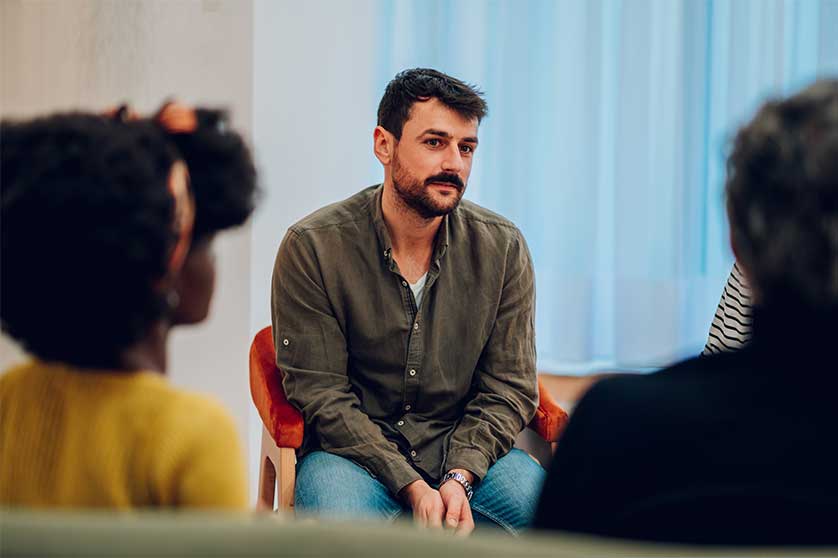What Does A Substance Use Disorder Treatment Plan Consist Of?
Each person with substance use disorder needs a personalized treatment plan. Depending on your needs, this plan may include services such as medical detox, therapy, support groups, medication-assisted treatment (MAT), wellness activities, case management, and aftercare planning.

Like many other diseases, substance use disorder (drug addiction) is treatable. To recover from it, you need an individualized treatment plan. This plan may include a variety of different interventions depending on your needs.
What Is A Substance Use Disorder Treatment Plan?
When you enter a substance abuse treatment program, a team of behavioral health professionals will work with you to design your personalized treatment plan.
Some treatment plans are inpatient, while others are outpatient.
Inpatient Vs. Outpatient
During inpatient treatment, you live at the treatment center and receive 24/7 care. During outpatient treatment, you live at home and regularly visit the treatment center. An addiction specialist can help you decide which option is right for you.
Assessment
Whether you choose inpatient or outpatient care, an effective treatment plan starts with a biopsychosocial assessment performed by your treatment team.
This assessment will include questions about your drug use, medical history, and family history. You will also be asked about your personal treatment goals. Along with quitting drugs, other common treatment goals include:
- addressing the causes of addiction, such as trauma, peer pressure, or co-occurring disorders
- building a stronger support system
- improving communication skins
- developing healthy coping strategies
Your treatment team will use this information to determine which services best meet your needs. The most common addiction treatment services include:
Medical Detoxification
Addiction often causes physical dependence. That means you use a drug so frequently that your body starts relying on it to function. If you stop using the drug, you may experience withdrawal symptoms.
Depending on the drug and your body, these symptoms may range from mild (such as nausea and trouble sleeping) to severe (such as hallucinations and seizures).
During medical detox, doctors help you safely stop using drugs with minimal withdrawal symptoms. They may also treat certain symptoms with medications, such as anti-nausea medications and sleep aids.
If you experience physical dependence, your treatment plan will likely start with medical detox. Detox typically lasts a week or two. After detox, you can start receiving the other services listed in your treatment plan.
Therapy
While medical detox addresses physical dependence, therapy addresses the psychological aspects of addiction, such as cravings, triggers, and coping strategies.
It can also help you manage co-occurring mental health issues, such as anxiety, bipolar disorder, or post-traumatic stress disorder (PTSD).
The most common types of therapy for addiction include:
- cognitive behavioral therapy (CBT), in which you learn to change unhelpful beliefs and behaviors that contribute to your drug use
- dialectical behavioral therapy (DBT), in which you learn to manage difficult emotions using mindfulness, distress tolerance, and other skills
- 12-step facilitation therapy, in which you learn recovery concepts popularized by 12-step groups such as Alcoholics Anonymous (AA)
- group therapy, in which you and your peers learn how to build a healthy, drug-free life
- family therapy, in which you and your loved ones learn to manage conflicts related to your addiction
Support Groups
In a support group, you can share your experiences with other people recovering from addiction. The most popular addiction support groups include:
- Alcoholics Anonymous (AA)
- Narcotics Anonymous (NA)
- SMART Recovery
- Women for Sobriety
- LifeRing Secular Recovery
These groups give you the chance to make friends who can help guide you through your recovery journey. Many people find support groups so beneficial that they continue attending them long after they complete an addiction treatment program.
Medication-Assisted Treatment (MAT)
If you have alcohol or opioid addiction, your treatment plan may include medications to ease your cravings and withdrawal symptoms. The most common medications used in MAT include:
- acamprosate, which reduces alcohol cravings
- buprenorphine, which reduces opioid cravings and withdrawal symptoms
- disulfiram, which discourages alcohol use by causing unpleasant side effects (such as nausea and headache) when you drink alcohol
- methadone, which reduces opioid cravings and withdrawal symptoms
- naltrexone, which blocks the pleasant effects of alcohol and opioids
According to the Substance Abuse and Mental Health Services Administration (SAMHSA), MAT can help you stay engaged in the addiction recovery process. It can also help you get and keep a job after you finish treatment.
Wellness Activities
When recovering from addiction or any other illness, you must take care of your health. That’s why many addiction treatment programs offer activities that boost your physical and mental well-being. Depending on the program, these activities may include:
- arts and crafts
- yoga, meditation, or prayer
- exercise
- aromatherapy
- acupuncture
Case Management
Many addiction treatment teams include a case manager. Your case manager can help you handle issues that may arise during treatment, such as bill payments and legal matters. They can also keep you on track with your treatment plan.
Aftercare Planning
Once you leave your treatment program, you must work hard to maintain your recovery. To help you on this journey, your treatment team will help you create an aftercare plan. This plan will feature strategies to reduce your risk of relapse, such as:
- ongoing therapy and support groups
- regular exercise
- transitional housing (also called “sober living homes”)
- assistance with education or employment
To learn more about addiction treatment plans, please reach out to Ohio Recovery Center. Our compassionate healthcare providers offer personalized, evidence-based care to help you or your loved one stay sober.
- National Institute on Drug Abuse https://nida.nih.gov/publications/drugs-brains-behavior-science-addiction/treatment-recovery
- Substance Abuse and Mental Health Services Administration https://www.ncbi.nlm.nih.gov/books/NBK572945/
- Substance Abuse and Mental Health Services Administration https://www.samhsa.gov/medications-substance-use-disorders

